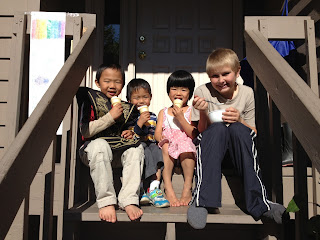Tantrums...a less pleasant part of parenting, and I would say it's only been over the past few months that we've had more issues with them and one child. It usually seems to be about control, ie, if you don't let me be in control, I will scratch and kick and hit for a very long time. And in the adoption world, you have "time in," where you are present, instead of time out (which I am not sure I bought into anyway). But if you are present, you are fair game for a little pain.

In our case, the latest tantrum ended in not being able to go sledding. But even as that consequence became clear, the child cried off and on for another hour saying, "I want to go sledding."
"But, because of your choices (hit, scratch etc), you don't get to go this time." (repeat Many times)
No connection of consequence. It's not always that way, but this particular time, the cause/effect seemed to evade. And so, I read and think and test out what to do next.
Meanwhile, I came across a great adoptive parent blog called
onethankfulmom that is a wealth of information. I'm sure the actual solution is somewhere in there, but in the meantime, I am reading a book she reviewed titled
The Boy Who Was Raised as a Dog by Bruce Perry.


illustration from: lfcc.on.ca
The author, a psychiatrist, describes through brain research and stories of children, how the brain develops. We always hear that children are so resilient, but he shows how, in fact, when they experience trauma, parts of their brain simply do not make the connections that normal children make. They are stalled, if you will, in a specific developmental place. For example, a neglected child who cries for food but doesn't receive it, does not connect that a cry will bring relief. So patterns of trust and empathy are not established.

a child's brain scotland.gov.uk
It's pretty deep food for thought...and I don't know factually the extent of what our children experienced, but I must behave as though there was trauma and try to understand what will heal them.













